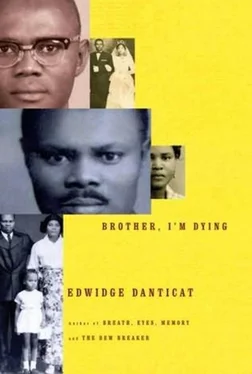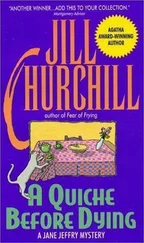A few days later, my father’s church’s deacon association hosted its yearly anniversary brunch at an all-you-can-eat Chinese buffet restaurant on Ralph Avenue in Canarsie, Brooklyn. My father’s ivory suit was so big on him that, as he’d put it on that morning, he’d added two more holes to his belt, which, overstretched, looked like scarred skin.
Dragging his gaunt frame between the tables to greet dozens of longtime friends, he seemed buoyant and jovial, but after each handshake and brief chat he had to lay his hand on someone’s shoulder to rest.
When he was done with his round of greetings, he filled a plate with fried chicken wings he never touched. As he coughed, some of the church members came over and held his hand. Others urged him to go home. They might have meant well, but he felt rejected. As if they didn’t want him near their food.
That same afternoon, my brother Kelly arrived from Massachusetts, so my father decided to hold a family meeting. That meeting, like all my father’s rare previous summits, was a rather formal affair. As we all sat around my parents’ long oak dining room table, framed by my mother’s ornately carved, antique-looking but brand-new china and enlarged photographs of our school graduations, weddings and Christmases, my father went directly to the matter at hand.
“The reason for this gathering,“ he announced, “is to discuss what is going to happen to your mother after I’m gone.”
My father was sitting in his usual seat at the head of the table. My mother was on the other end facing him. I was sitting on his left, her right, with Karl, who, at six foot one, towered over all of us. Kelly and Bob, the middle children, as I liked to call them, were sitting across from us. We were all stunned into silence by my father’s pronouncement, both those among us who thought we should recount to him what the doctor had said (brothers Karl and Kelly) and the rest of us who did not. But maybe the doctor was the wisest of any of us. Of course the patient always knows. My father must have suspected even before the doctor had. After all, he inhabited the body that was failing.
“I’m not getting better.” My father covered his face with his hands, then slowly pulled them apart as though he were opening a book. “And when a person’s sick, either you’re getting better or you’re dying.”
He said this so casually and with so little sorrow that my sadness was momentarily lifted.
“What would you like to happen after I’m gone?” he asked, looking directly at my mother. “Do you want to stay in the house, or sell it and buy an apartment?”
“I’m not going anywhere,” my mother said defiantly.
A line of sweat was growing over her lips as she spoke. I appreciated her unwillingness to embark for such an unknown world, to look toward another life, beyond her husband’s.
“The house might be too big for you to live in by yourself,” my father continued, matter-of-factly. “Someone would have to move in with you.”
I kept my eyes on the sheer plastic sheath that covered my mother’s hibiscus-embroidered tablecloth. Was my father trying to prepare us? Put us at ease? Show us that we shouldn’t worry about him, or was he trying to tell us that he was ready for whatever lay ahead?
“Pop.” Bob rubbed his eyes with his balled fists, then raised his hands to catch my father’s attention. While I’d been staring at the tablecloth, he’d been crying.
“Pop, can I ask you a question?” The tears were flowing down Bob’s face. He was easily the huskiest and the most overtly emotional of my three brothers, Karl being the most levelheaded and Kelly the most reserved.
“What is your question?” my father asked, his own eyes growing moist, though he was doing his best to hold back his tears.
“Have you enjoyed your life?” Bob asked, pausing after each word as if to take in its weight and meaning.
I lowered my head again, absorbing the stillness that also followed this question, the kind of hush that suddenly forces you to pay attention to so many unrelated things around you: the shell of the dead fly trapped in the window screen, the handprints on the plastic over the tablecloth, the ticking of a giant clock in the next room, the pressing desire for anything, including an explosion, to burst forth and disrupt the calm.
“I don’t know what to say about that.” My father drew in his breath, something that required a great deal of effort and thus resulted in a grimace-like contortion of his face. “I don’t-I can’t-remember every moment. But what I can say is this. I haven’t enjoyed myself in the sense of party and glory. I haven’t seen a lot of places and haven’t done that many things, but I’ve had a good life.”
My father went on to list what he considered his greatest accomplishments: Kelly, Karl, Bob and me, as well as his three grandchildren, Karl’s five-year-old son Ezekiel and two-year-old daughter Zora and Bob’s five-year-old daughter Nadira.
“You, my children, have not shamed me,” he continued. “I’m proud of that. It could have been so different. Edwidge and Bob, your mother and I left you behind for eight years in Haiti. Kelly and Karl, you grew up here, in a country your mother and I didn’t know very well when we had you. You all could have turned bad, but you didn’t. I thank God for that. I thank God for all of you. I thank God for your mother.” Then turning his eyes back to Bob, he added, “Yes, you can say I have enjoyed my life.”
Listening to my father, I remembered a time when I used to dream of smuggling him words. I was eight years old and Bob and I were living in Haiti with his oldest brother, my uncle Joseph, and his wife. And since they didn’t have a telephone at home-few Haitian families did then-and access to the call centers was costly, we had no choice but to write letters. Every other month, my father would mail a half-page, three-paragraph missive addressed to my uncle. Scribbled in his minuscule scrawl, sometimes on plain white paper, other times on lined, hole-punched notebook pages still showing bits of fringe from the spiral binding, my father’s letters were composed in stilted French, with the first paragraph offering news of his and my mother’s health, the second detailing how to spend the money they had wired for food, lodging, and school expenses for Bob and myself, the third section concluding abruptly after reassuring us that we’d be hearing from him again before long.
Later I would discover in a first-year college composition class that his letters had been written in a diamond sequence, the Aristotelian Poetics of correspondence, requiring an opening greeting, a middle detail or request, and a brief farewell at the end. The letter-writing process had been such an agonizing chore for my father, one that he’d hurried through while assembling our survival money, that this specific epistolary formula, which he followed unconsciously, had offered him a comforting way of disciplining his emotions.
“I was no writer,” he later told me. “What I wanted to tell you and your brother was too big for any piece of paper and a small envelope.”
Whatever restraint my father showed in his letters was easily compensated for by Uncle Joseph’s reactions to them. First there was the public reading in my uncle’s sparsely furnished pink living room, in front of Tante Denise, Bob and me. This was done so there would be no misunderstanding as to how the money my parents sent for me and my brother would be spent. Usually my uncle would read the letters out loud, pausing now and then to ask my help with my father’s penmanship, a kindness, I thought, a way to include me a step further. It soon became obvious, however, that my father’s handwriting was as clear to me as my own, so I eventually acquired the job of deciphering his letters.
Читать дальше












